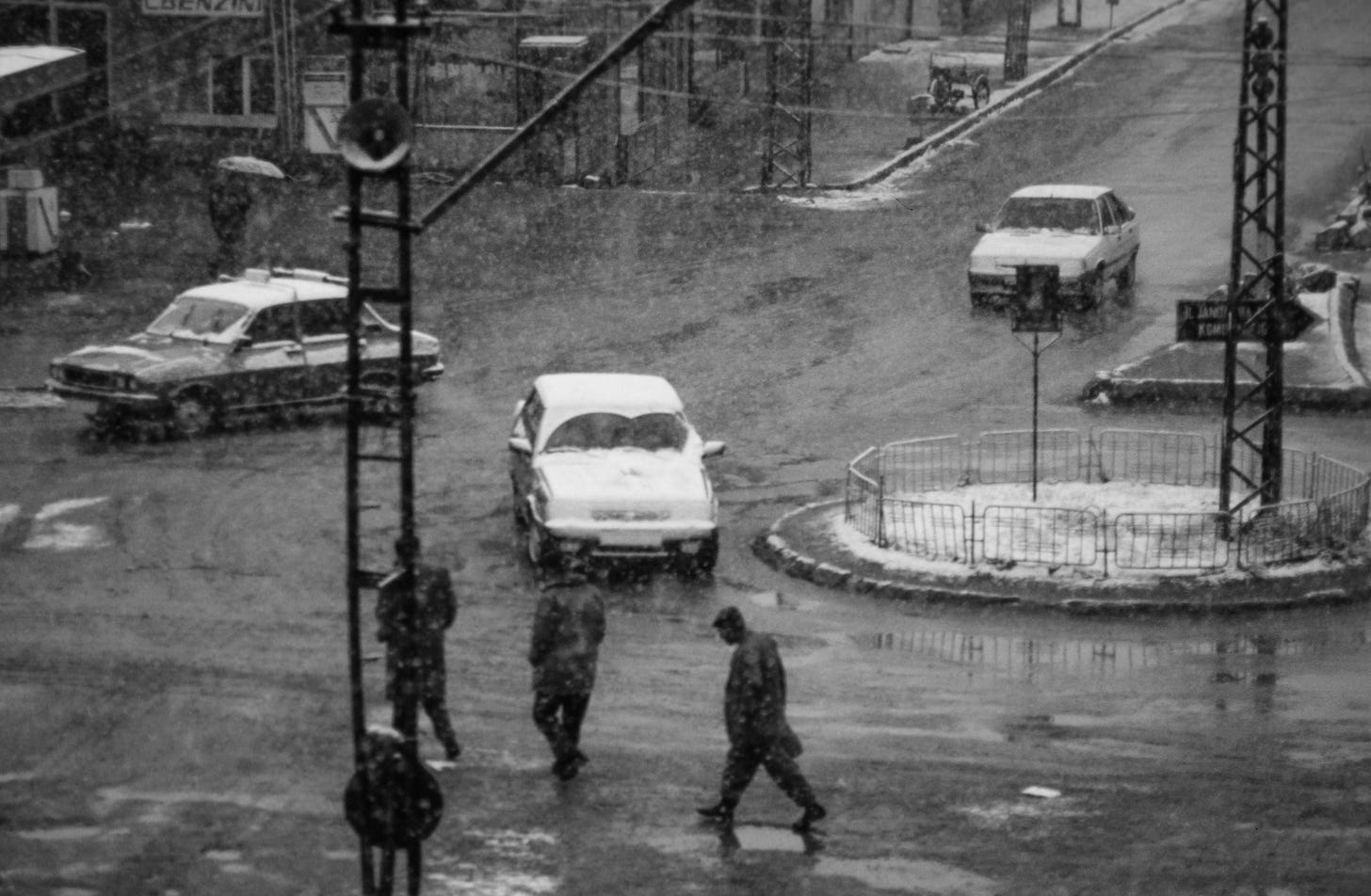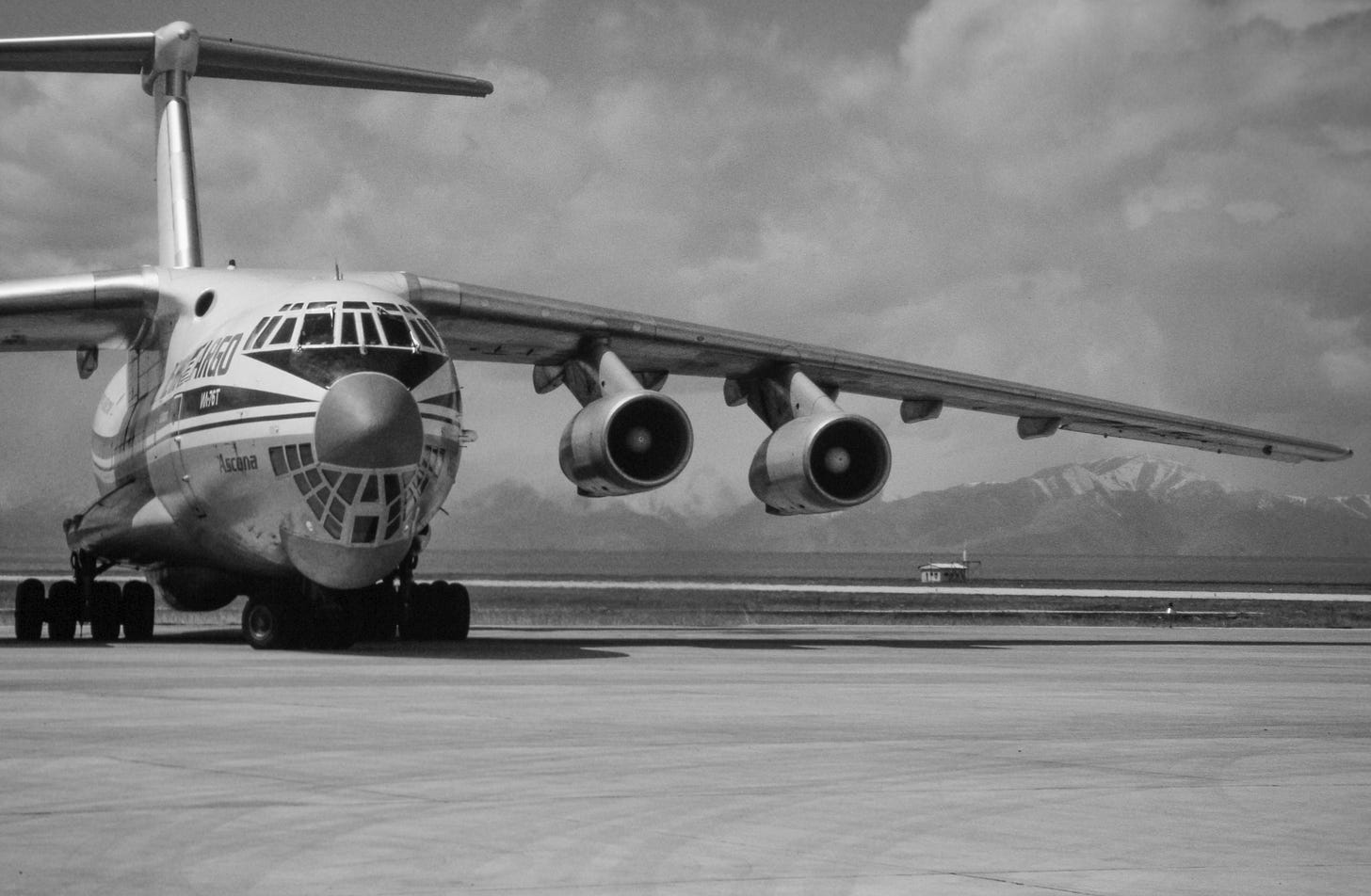The Perfection of War
Part 1: Snowfall in Anatolia
Snow was falling when we crossed into Anatolia.
The driver was from Izmir; he had never seen snow before. He gripped the wheel like a sledgehammer about to break free, squinting into the white blur, afraid of the slide. I took over. The wipers squealed against the packed snow. Behind us, darkness swallowed the last of the Silk Road.
By dawn we rolled into Van, a city muffled under a grey sky and piles of melting snow. Our contact was waiting, a man from the Kurdish political movement, owner of a carpet shop that smelled of raw wool and sweet tea. He led us downstairs to a dim Turkish bath where steam rose in thin ribbons.
While my body thawed, he traced maps with his fingers on the wet marble.
Three refugee camps. One main valley near a village called Çukurca.
He did not know yet, one or two hundred thousand people, maybe more.
Barely a road.
Almost no water.
And certainly no permission.
He smiled at that word “permission” like a man quietly claiming freedom against authority.
The Birds Who Only Fly
The next day, a Russian cargo plane circled above the airport, a massive quadri-reactor Ilyushin, majestic even in its noise, a relic of the genius of a fallen empire.
The crew spoke no English, especially when sober. On the ground they moved awkwardly, heavy boots, oil-stained uniforms, men built for motion yet stranded in gravity, and in the meltdown of their own history. Like birds, they only felt free when they flew.
Serguei, a pilot with the eyes of a man who had seen too much, said wryly as he handed me the cargo manifest, “I fly guns, gas, food. I no fly hope. Hope too heavy.”
One reactor exhaled a ribbon of dark exhaust, as if remembering coal. I stood in the cockpit as the mechanic checked gauges with a cigarette hanging from his lips. He muttered an insult in Russian, banged loudly on a pipe, then shrugged.
We offloaded, and they took off anyway, too long to wait for a spare part. At 5,500 feet, sound seems to travel faster. The vibration ran through my ribs as they pushed the plane down every inch of tarmac before lifting into the thin air. This time again, they made it.
I realized then that sometimes you have to bet high stakes to make miracles happen. And I knew we would need that kind of faith for what was coming.
Valley of Dust
Up in the mountains, the snow melted into the earth beneath the trucks’ wheels. Helicopters came and went, rattling the sky. Each descent kicked up a storm of debris. I’d rush out, ducking under the blades slicing the air above my head.
The camp spread like a bleeding wound across the valley, a sea of makeshift tents, canvas, smoke, and human noise. A smell I knew too well: a mix of despair and anger.
We mapped the place, counted people in twenty-by-twenty-meter squares, and estimated one hundred and twenty-five thousand refugees in that valley alone. With a predictable mortality rate of twenty per ten thousand per day, that meant about two hundred and fifty deaths every sunrise. Mostly children.
Water was the first god we prayed to.
Five liters per person, six hundred and twenty-five tons daily.
That’s sixty-five trucks a day on a mountain road that was never paved.
We rented every truck, bargained for containers at the market, haggled for blankets, tarpaulins, cooking pots, and argued for everything with Turkish authorities who wanted their cut.
At night I slept in my clothes, half expecting the phone to ring with new challenges.
When it did, it usually found me awake.
The Sound of Falling Things
The airdrops started on the fifth day.
We heard the low growl of Hercules cargo planes crossing the valley, cargo doors yawning open.
Free-fall pallets of food tumbled from the sky, bursting on impact, spilling their entrails across the dirt.
Beyond the camp limits, only minefields.
When the first pallet fell, the crowd ran, men, women, children, all at once.
The children reached first.
Then came the blasts.
Not one. Many.
The sound doesn’t echo; it lands inside your chest and stops the air.
I was standing by the hospital tent. By the time the smoke lifted, I saw him running from the crowd, a man shouting, a bundle clutched against his chest. Blood seeped through the blanket, spattering his grey tunic. When he reached me, he thrust it forward, pleading, a raw desperation breaking through every sound.
I froze. The air between us thickened. He kept shouting, insisting I take it, the child, certain I could still help. But whatever he carried no longer moved.
Before I could answer, a nurse came, Kurdish too, and wrapped his arms around the father, pulling him back, whispering something low. They turned away together, the father still calling out, his voice splintering against the noise.
I stood there, useless.
Everyone screamed, muffled by the roar of the turboprops, a sound somewhere between war drum and windmill, and the crushing of pallets falling from the sky.
That night, I washed the dust from my hands and watched the red swirl down the drain.
Inside, a heavy emptiness.
I brushed it off.
Feeling was a luxury for later.
Lessons From Hell
Days blurred into nights.
Food. Logistics. Meetings. Dead batteries. Broken promises.
People crashed mid-shift, asleep on tables or against walls.
Exhaustion was convenient, it stripped away doubt.
One morning, a French surgeon stepped out of the hospital tent after a night on duty. A few days earlier he had arrived from Paris, confident and immaculate, questioning every decision I made with the condescending certainty of a man used to command.
Now his clothes were stained. His soul absent. His eyes grey, emptied of spark.
He sat beside me, wordless.
Then:
“I’m sorry.”
“I had no idea.”
“I see what you are doing.”
“I don’t know how you can do it.”
Pause.
“I lost twenty-seven children tonight. More than in my whole career.”
Silence again.
Then he stood, nodded, and left.
I never saw him again.
There are no medals for that kind of defeat.
Next week:
The Perfection of War
Part 2: The Crossing
If you want to support my work:
Subscribe — or even better, become a paid subscriber. Once I reach 100 paid subscribers (I’m already halfway there!), Substack will add a tag that could help me gain more visibility.
Engage (free and powerful!) — Visit the website, find the post you enjoyed most, and leave a comment at the end. Extra karma point if your comment is impertinent, sassy or even contains a question!
PS: “Change Your Story, Change The World” is a storytelling endeavor that looks deeply into the psyche that creates the stories we live by—with the intention to help us shape better stories, both personally and collectively.
Because the stories we tell are the reality we live.





Searing. Haunting. Beautifully told.
Beautifully reflected my friend.